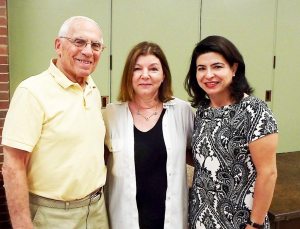
Kensington resident Anna M. Kaplan’s appearance at the Great Neck Social Center last week revealed the Town of North Hempstead Councilwoman’s pride, modesty, dedication to public service, and appreciation and love for her adoptive country.
Kaplan agreed to step in as a last-minute replacement guest speaker at the center’s monthly Veterans’ group meeting, where she talked about her experiences escaping from Iran after the 1979 revolution and how she connected with public service after attending law school here in New York.
The councilwoman, who has lived in Great Neck for more than 20 years with her husband, Darren, and their two daughters, Sarah and Taylor, is proud of her distinction as the first Iranian-born American to be elected to a full-time municipal office in New York State.
“I never thought in a million years that I would be running for office,” she began, in describing her life, growing up Jewish in Tabriz during the Shah’s reign and overthrow. “I love this country and I can never do enough.” she remarked, after her 90-minute appearance.
“I’m very proud and privileged
to represent my district,” she said about her position, won in a 2011 election on the Democratic line.
“We are blessed to be living here. What makes our community so wonderful is the fact that it’s so diverse. This is what America is all about. This is the foundation on what America was built on, people coming from all over and bringing all their assets and attributes and sharing them with everyone.”
She has already announced that she’s running for reelection in November. She represents the approximately 40,000 residents of Kings Point, the Village of Great Neck, Thomaston, some unincorporated areas of Great Neck and Manhasset, and the Villages of Roslyn, Roslyn Estates and North Hills in the 4th District. Councilwoman Lee Seeman represents the other areas of Great Neck, including Lake Success.
“I came to this country when I was about 13 years old,” Kaplan recalled, mentioning that she came here with a group of about 40 other children, leaving her parents behind.
She spoke of the difficulties a Jewish family had in Iran, both before and after the fall of the Shah. “We did not vote,” she said. “We were not really allowed to participate in any of the politics. We did not really have anyone in the government.”
“We kept very low key. People felt that it wasn’t a very safe place for their kids and themselves, being Jewish. I can remember hearing ‘death to America, death to Israel, death to Zionism,’ as a teenager.”
“It was really hard to get up each day and realize that you don’t feel safe anymore. People were coming and trying to awaken the Jews and tell them that ‘you need to leave the country. And if you can’t leave, let us help you and get the kids out.’”
She went to high school in Chicago and moved to New York with her family after her parents successfully escaped. Here, she attended Yeshiva University before getting her law degree from Cardozo.
She began in Great Neck working on the PTA and with her synagogue, Temple Israel. She laughed when she referred to her marriage to her husband. “I was fortunate to find a wonderful Ashkenazi boy by the name of Darren Kaplan,” she said. “I think I was one of the first to marry outside [the] Persian [community]. I’m basically a little bit of a black sheep of the family.”
Her first elected office was as a trustee for the Great Neck Library. She was later appointed to the North Hempstead Zoning Board of Appeals. Then she was asked to run for her current position.
At the meeting last week, Kaplan also spoke about her experiences as an officeholder and took questions from the audience. “I’ve worked on a few projects,” she said. “As you know, anything with government takes a little time.” She’s hopeful that a 72-unit affordable housing initiative for seniors on Community Drive will move forward quickly.
Executive Social Center director Ann Tarcher is an enthusiastic supporter of Kaplan’s. “She has done so much for the community in those four years,” Tarcher said. “She quickly stepped in to appear here when our first speaker canceled.”
Both Kaplan and Tarcher answered a question from an audience member who asked what was being done to solicit support from the growing Persian and Asian population in the area.
“I know that has always been issue in reaching out,” Kaplan acknowledged. Tarcher spoke about the Sephardic Heritage Alliance, a group dedicated to sustaining Persian culture that has been supportive and helpful with funding.
“We are trying to reach out to the Asian population, too,” Tarcher said. “There we’ve not been as successful. We’re going to try and get translators for our Asian population. We do have translators for the Persian language.”































